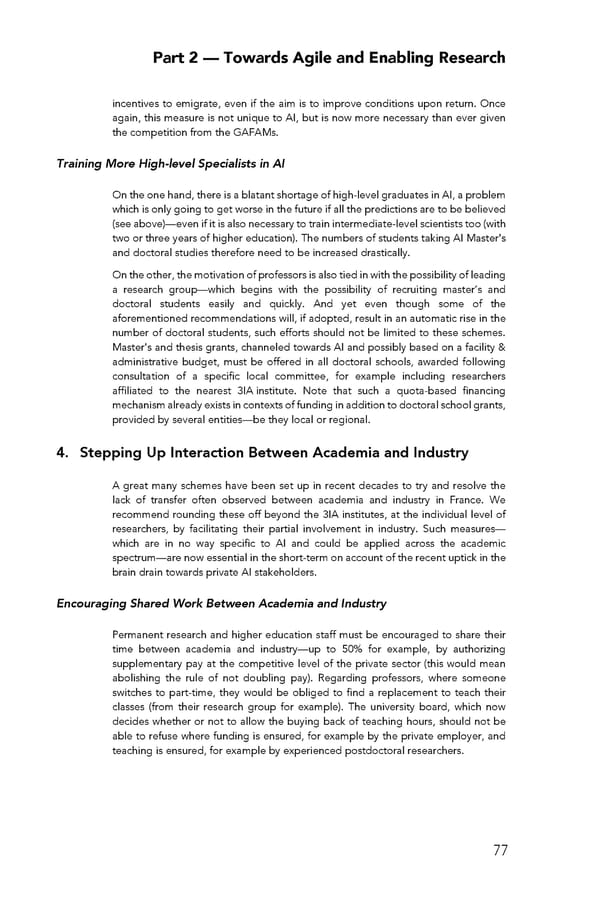Part 2 — Towards Agile and Enabling Research incentives to emigrate, even if the aim is to improve conditions upon return. Once again, this measure is not unique to AI, but is now more necessary than ever given the competition from the GAFAMs. Training More High-level Specialists in AI On the one hand, there is a blatant shortage of high-level graduates in AI, a problem which is only going to get worse in the future if all the predictions are to be believed (see above)—even if it is also necessary to train intermediate-level scientists too (with two or three years of higher education). The numbers of students taking AI Master's and doctoral studies therefore need to be increased drastically. On the other, the motivation of professors is also tied in with the possibility of leading a research group—which begins with the possibility of recruiting master’s and doctoral students easily and quickly. And yet even though some of the aforementioned recommendations will, if adopted, result in an automatic rise in the number of doctoral students, such efforts should not be limited to these schemes. Master's and thesis grants, channeled towards AI and possibly based on a facility & administrative budget, must be offered in all doctoral schools, awarded following consultation of a specific local committee, for example including researchers affiliated to the nearest 3IA institute. Note that such a quota-based financing mechanism already exists in contexts of funding in addition to doctoral school grants, provided by several entities—be they local or regional. 4. Stepping Up Interaction Between Academia and Industry A great many schemes have been set up in recent decades to try and resolve the lack of transfer often observed between academia and industry in France. We recommend rounding these off beyond the 3IA institutes, at the individual level of researchers, by facilitating their partial involvement in industry. Such measures— which are in no way specific to AI and could be applied across the academic spectrum—are now essential in the short-term on account of the recent uptick in the brain drain towards private AI stakeholders. Encouraging Shared Work Between Academia and Industry Permanent research and higher education staff must be encouraged to share their time between academia and industry—up to 50% for example, by authorizing supplementary pay at the competitive level of the private sector (this would mean abolishing the rule of not doubling pay). Regarding professors, where someone switches to part-time, they would be obliged to find a replacement to teach their classes (from their research group for example). The university board, which now decides whether or not to allow the buying back of teaching hours, should not be able to refuse where funding is ensured, for example by the private employer, and teaching is ensured, for example by experienced postdoctoral researchers. 77
 For a Meaningful AI - Report Page 77 Page 79
For a Meaningful AI - Report Page 77 Page 79